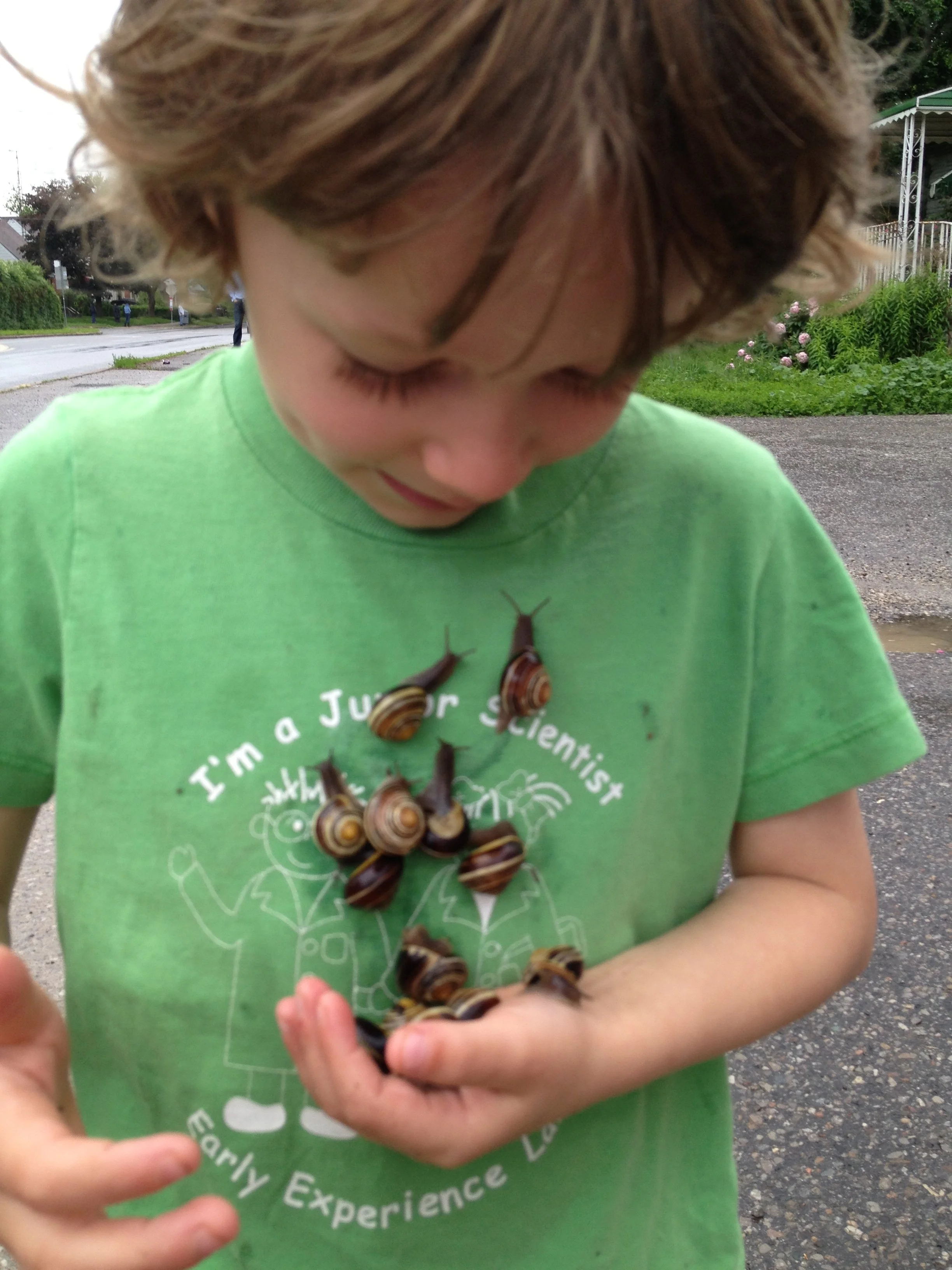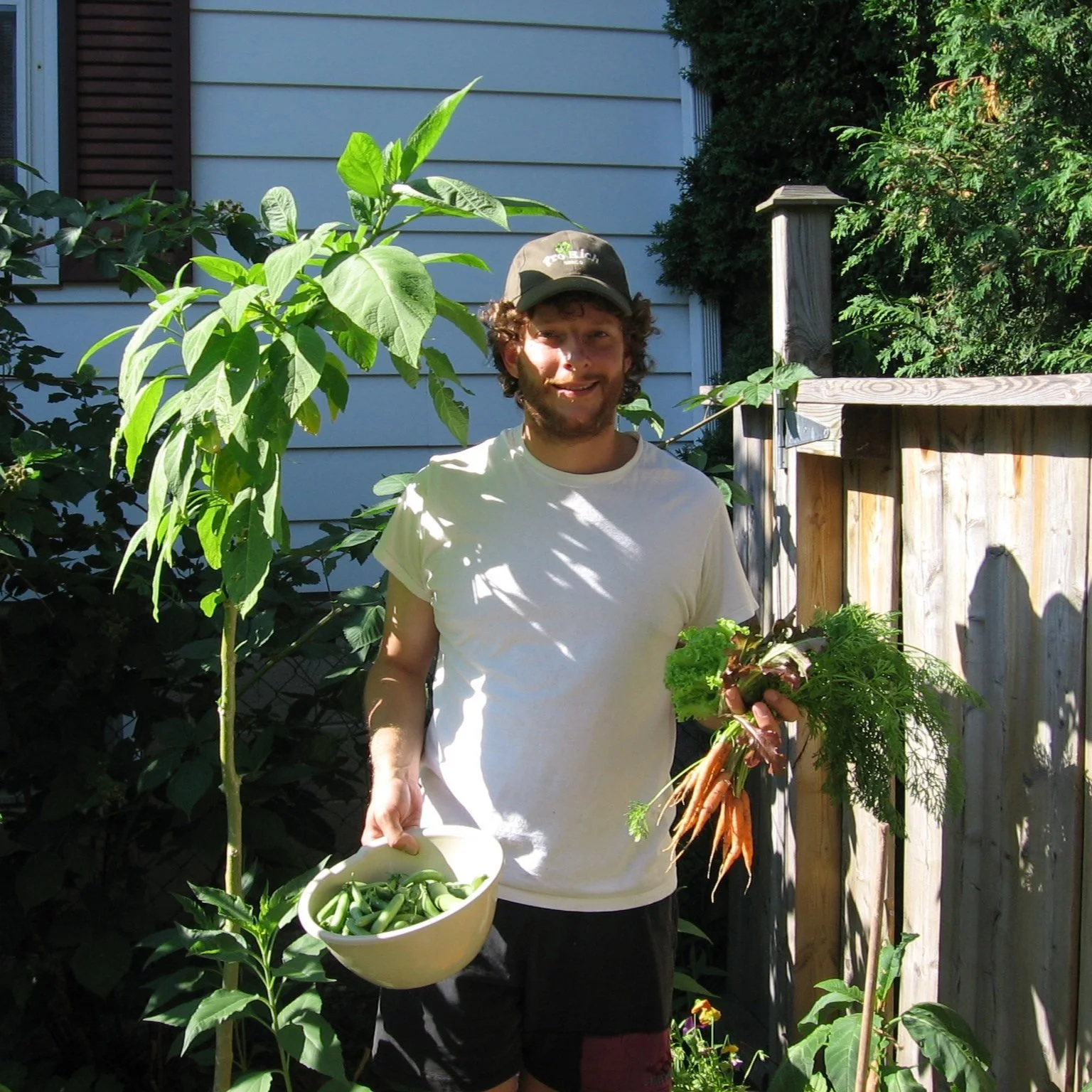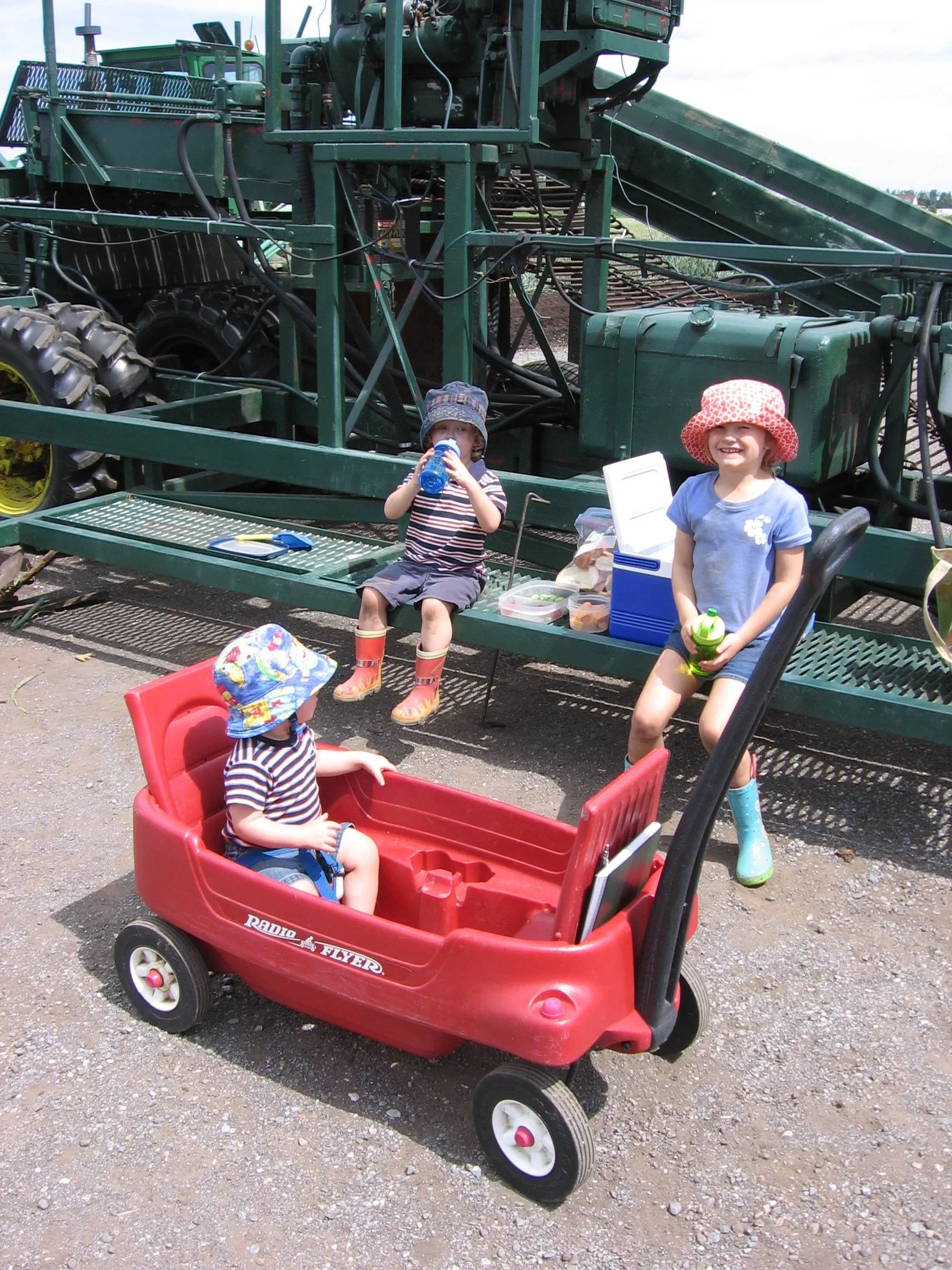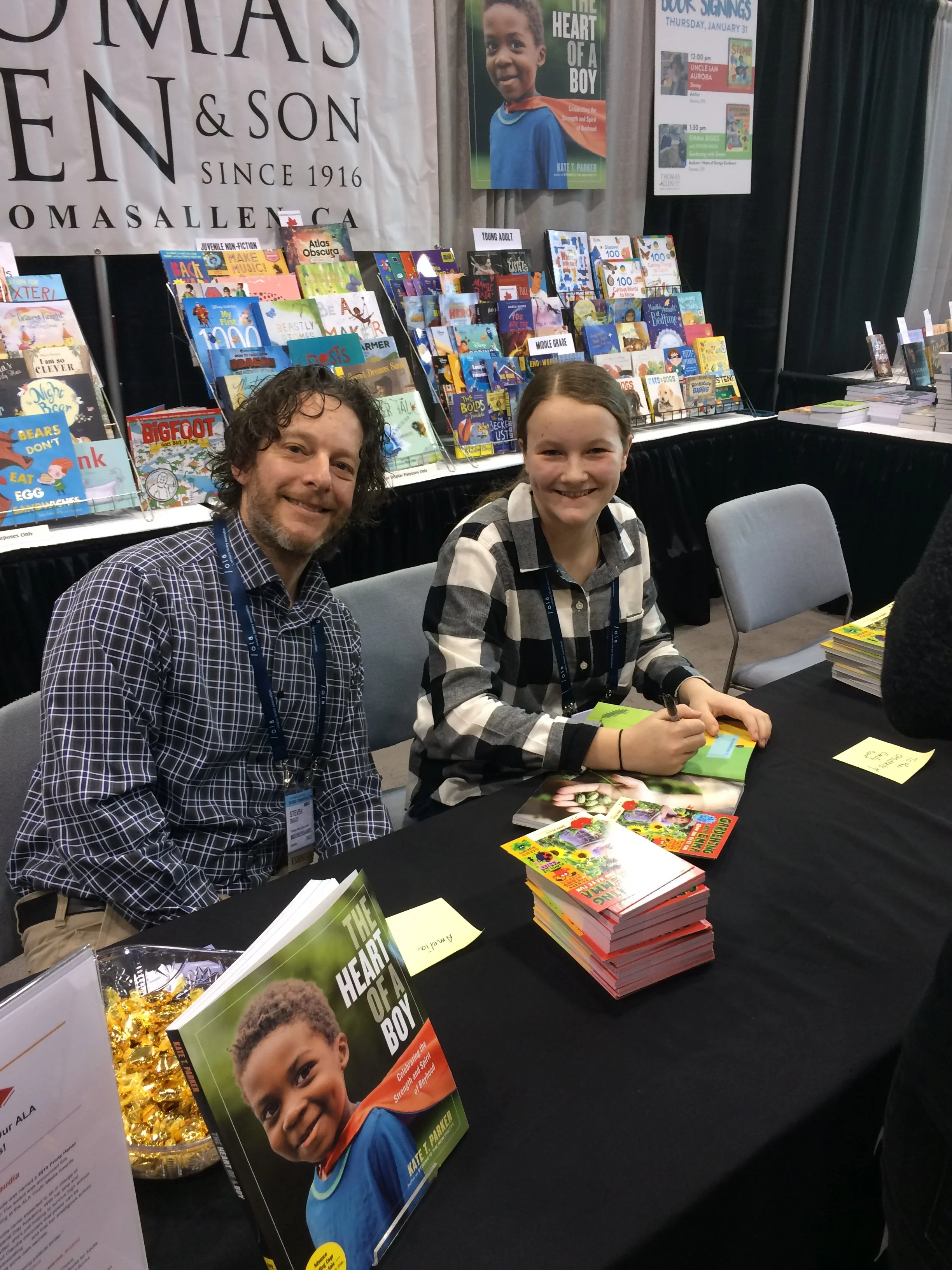Garden Career Pivot
By Steven Biggs
Working in Horticulture
I’ve had a number of readers and students ask about working in horticulture. Some are ready for a career change. Some are thinking about schooling.
But for me, working in horticulture involves going beyond working with plants and soil. It also include the internet and a way of expanding what I can earn in the field of horticulture. Read on to discover what I mean.
(And, yes, snails fit into my own story, as you’ll see below.)
The Great Snail Race
“There is a whole big family of snails I was just getting,” Keaton told me matter-of-factly.
He looked down at them as they moved from his cupped hand onto his shirt. The most daring of the snails was already halfway up his shirt.
But the adventures of the snail family didn’t end with the trek up Keaton’s shirt.
That slow climb up the shirt was just the beginning.
Keaton and the snails.
Next, the snail family sailed across a big puddle on our driveway, on a barely seaworthy scrap of wood. And once they’d sailed to the far side of the puddle, the adventures continued on the slide…with a snail race.
From Rat Race to Snail Race
I cherish that memory. It was a wet walk home from the schoolyard as Keaton collected all those snails.
At the time, my day revolved around walks to and from school. Morning drop-off. Midday drop-off. Afternoon pickup.
It wasn’t all snail races. I was at my desk working before the kids woke up. And between drop-off and pickup I’d snatch moments at my desk whenever I could.
The routine wasn’t something I imagined when I was at my previous job.
The routine was the result of an unwise (but fortunate) decision. I’ll tell you more about that decision in a moment.
But as a result of that decision I was out of the rat race. I was no longer a stressed-out commuter. I enjoyed small pleasures like snail races. And after wanting to quit the city, I was really enjoying city life.
I Started My Garden Work as an Imposter (At Least I Felt Like It)
It was 2006.
Even though the rat race was in the rear-view mirror, I hadn’t quite found myself. At least, I hadn’t convinced myself.
Asked about my profession, I’d hesitatingly respond, “garden and farm writer.” In hindsight, there was no need to hesitate.
My experience checked the right boxes:
I’d been a gardener since I was a kid. As a teen had my own gardening business. As a student I got a degree in agriculture and went straight into the horticulture industry. Check.
And in all of the jobs I’d had along the way, I’d been the person who would put together disparate bits of information into written guides and lists. I get a kick out of sorting and packaging information. Check.
Today
Keaton holding a copy of my first book, No Guff Vegetable Gardening.
My gig today is garden communications. I juggle a few things that relate to gardening and communications. I work as a college instructor, broadcaster, speaker, and writer.
I’ve been honoured to get recognition for my magazine articles, books, and broadcasting. And I was recognized as one of the “green gang” of Canadians making a difference in horticulture.
Most important for me is the flexibility. Almost all of what I do is online. That means I camp with my kids in the summer. If I want to go ice fishing for a day in winter, it’s my call. I can’t not work—but I can weave work around other important parts of my life.
Thinking of a Change?
There’s a need for people in the horticultural industry.
If you’re looking for horticultural work, here are just a few of the roles you can consider:
Landscaping
Landscape design
Greenhouse technician
Retail
Wholesale supplies
Research
Consulting
Here’s a neat apprenticeship option here in Ontario.
Want to grow food? Here’s a neat program near Toronto.
Deciding Who’s the Boss
A lot of people like being an employee: It gives structure and security.
There’s also the option of creating your own work. It’s the path that I followed.
And that brings me back to my unwise decision—the one I mentioned earlier.
How an Unwise Decision Turned Me Into a Garden Writer
My unwise decision was a career change. But I made it for a good reason: Balance.
I was aiming for more family time and less commuting time. To change the balance in my life, I left a job in agricultural marketing to work as a recruiter.
Why as a recruiter?
For no other reason than the office was a bicycle ride from my place. I wanted to be closer to home.
I figured that because I was good at working phones I would be fine in this phone-based work. But there was a problem: I was not good at it…
Months passed. I was still not good at it. Meanwhile, my wife Shelley was just about to wrap up maternity leave, and we weren’t excited about the prospect of daycare. Plus I needed to help my parents more.
It was a collision of life events—not any foresight on my part—that got me to take the leap. The leap from employee to self-employed.
One other thing really helped. An internet connection.
An Internet Connection can be a Gateway
Connecting with work on the internet is easier now than when I started. (I took an HTML coding lesson so I could manage my first website!) Things are much more user-friendly now.
But even though it’s more user friendly, an internet connection or a website or a social media following isn’t a guaranteed income. It’s just a gateway to other people.
So if you’re thinking of creating work, your challenge is to figure out what value you can provide.
First: Take Stock
What are you good at; and what are you not good at?
I suggest you make a checklist for yourself.
For example, my checklist at the time of the great snail race would have looked like this:
Growing food had become a big part of my life — the kind of thing to put on your list as you take stock of your unique experiences
Good on the phone (too much time spent as call-centre slave!)
Not good at being pushy with people
Write well
Can shut up and let people tell me their story (from working on a help desk)
Like to sniff around for leads (from a short career tangent into fraud prevention)
Know how to grow (I’d turned my small urban backyard into a mini farm)
So if you’re thinking of change, stop now and make your own list like this.
Jot down your life experiences. It may seem insignificant; it’s not.
Next: Take Time
As you think about how your different life experiences give you a unique perspective, be open to new ideas.
The final nudge into a garden-focused career arrived when I was on a plane. I unknowingly sat beside an editor for an online magazine. We chatted, and she asked if I wrote…
Then: Grow New Skills
If you want to give people value that they’ll pay for, you might need new skills, or to brush up on skills you have.
In my case, I took night school courses on writing and journalism. Then I joined a garden writer’s association, a farm writer’s association, and a professional writer’s association because I really didn’t know how to go about becoming a “real” writer.
You Might Feel Uncomfortable
I left the house for my first garden writer’s meeting feeling like a fraud. Then I nearly walked out the door when I arrived. It was a sea of grey hair. A bit intimidating for a 30-something. But I met another writer who I then collaborated with to write my first book.
At the first farm writer’s convention I went to, I felt like a misplaced urbanite. But I swapped business cards with an editor, and that led to a decade-long gig writing farm-business articles.
Keep Pivoting
On assignment writing a farm business article, with the kids.
Industries change. Work changes. And your personal needs will change.
When my kids were little I’d pack them up and take them out on assignment to write an article about a farm. We had a few fun adventures.
As they got bigger, I jumped into the topic of gardening with kids, and my daughter Emma and I did videos and books together. (You can see some of that here.)
Now they’re all teenagers. I have my workdays to myself—and I’m blogging and podcasting on a regular schedule. I’ve been honing my interviewing skills, and I love it.
When the pandemic came and people moved to online learning, I pivoted and started teaching my own online gardening courses.
It can feel uncomfortable sometimes, but put yourself outside of your comfort zone.
Set Your Expectations
My daughter Emma signing copies of her book Gardening with Emma.
I see lot’s of online get-rich-quick and passive-income schemes.
My experience is that I can sell something I create when it gives people value and when they want it.
Passive income is an fair goal: After I put the work into a book or online masterclass, there is some passive income from future sales. But there’s also ongoing selling needed. So it’s not entirely passive.
The other thing you’ll want to hash out as you set your expectations is just what you want. This brings me back to the idea of balance.
For me, balance looks like this these days:
Make 3 meals a day for my hungry teenagers
Time with my dad
Time in the garden (so I can write about it)
Write about what I love
Regular garage band practice
No social media apps on my phone
You’ll see my expectations go beyond income-earning activities.
With the expectations I set, I work long days. Some nights I’m teaching until 10 p.m. – then I’m up at 5 a.m. to blog before the morning maelstrom of household teenage emotions puts me in a haze.
Ultimately, the mix you choose should be emotionally and financially sustainable for you. And it should be something that you like enough you can keep doing it. (I’ve had writing assignments that were so painfully mind-numbing that I froze. They weren’t sustainable. I quit those gigs.)
Next Steps
So whether you’re an urban person focused on life balance that includes gardening, or a rural homesteader considering ways to add to the homestead income, here are two questions to start with:
Employee or self-employed
Online work or location-dependent work
As you’re thinking about those questions above, start your creative process:
Take stock of your unique experience and skills
Take time
Grow your skills
Be uncomfortable
Be prepared to pivot
Set your own expectations for success






